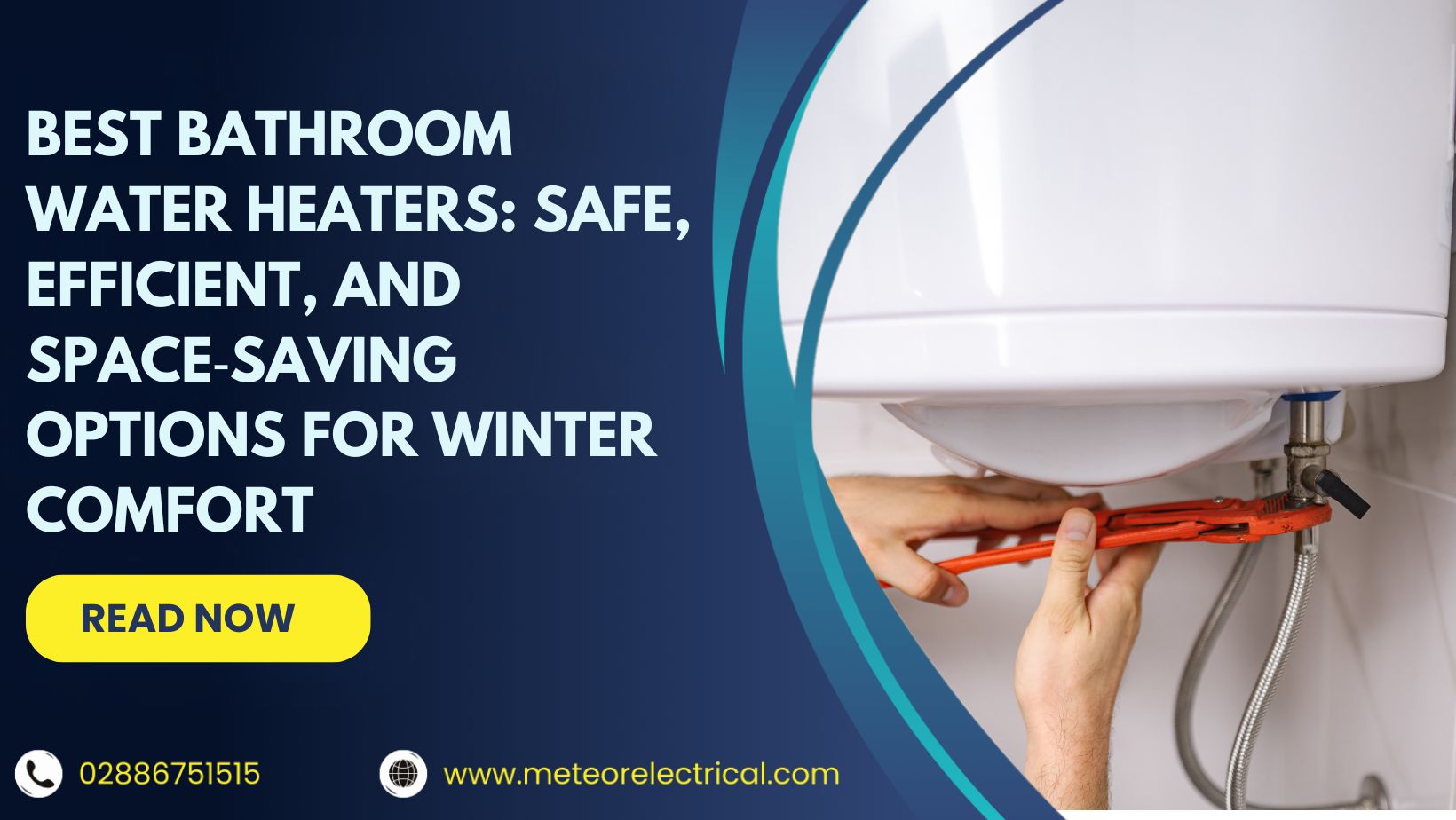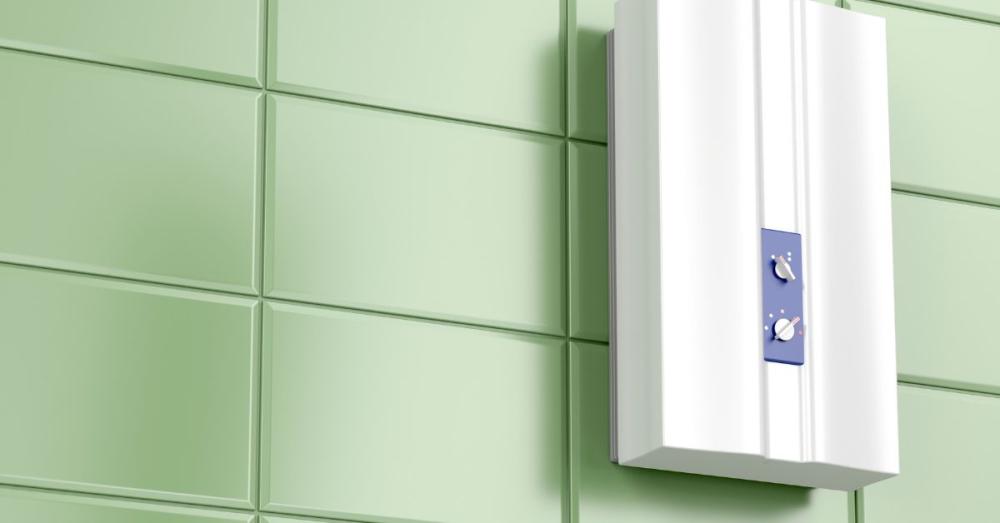Best Bathroom Water Heaters: Safe, Efficient, and Space‑Saving Options for Winter Comfort
Best Bathroom Water Heaters: Safe, Efficient, and Space‑Saving Options for Winter Comfort
As the winter chill sets in, quick access to hot water turns everyday routines into cozy comforts, from soothing showers to warm hand washes that take the edge off cold mornings. Choosing the right bathroom water heater isn’t just about heat, it’s about safety in humid spaces, energy efficiency, and space savings in tight rooms. The best options balance instant hot water with proper IP ratings, reliable performance, and a compact footprint to fit under sinks or on walls without clutter. This guide breaks down what to buy, where to install it, and how to stay compliant with bathroom zoning and IP standards this winter.
What Are Bathroom Water Heaters?

Not all water heaters are suitable for bathrooms because steam, splashes, and moisture increase electrical risk and demand specific protection levels defined by IP codes and bathroom zoning. Purpose‑built bathroom water heaters are engineered for damp environments, compact spaces, and flexible mounting, making them ideal for sinks, en‑suites, and guest bathrooms. These units deliver hot water where it’s needed without relying on a distant central cylinder, improving comfort and reducing waste.
Key Features of Bathroom Water Heaters
- Moisture resistance: Units built for bathrooms include ingress protection against splashing water and humidity to reduce electrical hazards in wet zones.
- Compact size: Small footprints fit under sinks or on walls, perfect for tight bathrooms, cloakrooms, and utility spaces.
- Mounting flexibility: Wall and under‑sink options allow point‑of‑use hot water with short pipe runs for faster delivery and less heat loss.
Types of Bathroom Water Heaters
Under‑Sink Water Heaters
- Compact, point‑of‑use heaters that fit in a vanity or cabinet to supply a single tap or small zone efficiently.
- Benefits: Reduce wait time by placing heat at the fixture and minimize wasted water versus long pipe runs from central tanks.
Electric Water Heaters for Showers
- Demand‑type (tankless) units designed for shower supply, sized to flow rate and temperature rise for instant comfort.
- Benefits: Hot water on demand without a storage tank, with higher efficiency at typical daily usage levels.
How They Work
- Instant heating: Demand‑type models heat water only when the tap is open, achieving 24%–34% higher efficiency at lower daily hot water usage compared to storage tanks.
- Flexible connection: Point‑of‑use placement supports cold‑water feed with precise temperature control, reducing pipe losses and wait times.
Installation Benefits
- Space‑saving: Small units tuck under counters, mount above or below basins, or sit near kitchen sinks to free floor area and shorten pipe runs.
- Quick access: Instant or near‑instant hot water at the point of use means less waiting and less water down the drain.
Additional Features
- Thermostat control: Digital or manual temperature settings tailor comfort and prevent scalding at the fixture.
- Energy efficiency: Selecting higher UEF/EF and right‑sizing to your flow and temperature rise lowers energy spend across seasons.
- IP rating: Choose models with suitable IP codes for the bathroom zone to ensure splash protection and compliance.
Why Choose a Small Bathroom Water Heater?
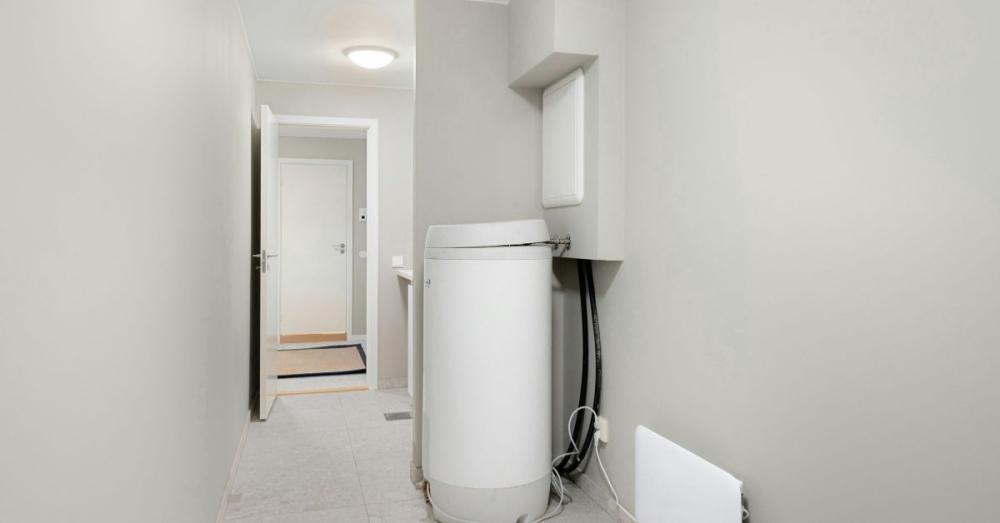
- Localised heating: Serve a basin, en‑suite, or loft bathroom independently to avoid long waits from a central system.
- Energy savings: Demand units avoid standby losses and operate only when water flows, improving efficiency and running costs.
- Convenience: Compact design, simple mounting, and instant comfort make daily routines smoother and faster.
Understanding IP Ratings for Bathroom Water Heaters
Ingress Protection (IP) codes indicate how well equipment resists solids and liquids, with two digits, first for solids, second for water, set by EN 60529/BS EN 60529 standards used in the UK and EU. In wet rooms, complying with the correct IP rating by zone lowers shock risk and ensures safe operation around splashes and jets. Bathroom fixtures placed in misclassified zones can present unnecessary hazards.
What Does IP Rating Mean?
- IP structure: The first digit covers dust/solids, while the second digit covers water ingress from drips to immersion; for example, IP44 indicates splash protection from all directions. (Meteor Electrical's IP Ratings Chart).
- Standards: UK/EU products reference BS EN 60529/EN 60529, providing consistent definitions for protection levels and testing methods.
Why IP Ratings Matter in Bathrooms
- Moisture‑heavy spaces: Showers and basins produce splashes and steam, requiring fixtures rated for their location to avoid faults and shocks.
- Compliance: Selecting the correct IP rating per zone aligns with best practice guidance used by UK installers for safe bathroom electrics (International Code Council).
IP Rating Zones in Bathrooms
- Zone 0: Inside baths or showers; immersion exposure demands a minimum of IP67 to withstand temporary submersion.
- Zone 1: Above bath/shower up to 2.25 m; IP65 recommended, with RCD protection for 240 V circuits in this zone.
- Zone 2: 0.6 m beyond bath/shower up to 2.25 m high; minimum IP44, which many near‑basin placements should follow within a 60 cm radius.
Choosing the Right IP Rating
- Identify zone: Map your planned heater position to the correct zone around the bath, shower, or basin before purchase.
- Match rating: For near‑sink installs in Zone 2, target IP44 or higher; for shower vicinity in Zone 1, aim for IP65 with proper circuit protection.
Different Types of Bathroom Water Heaters
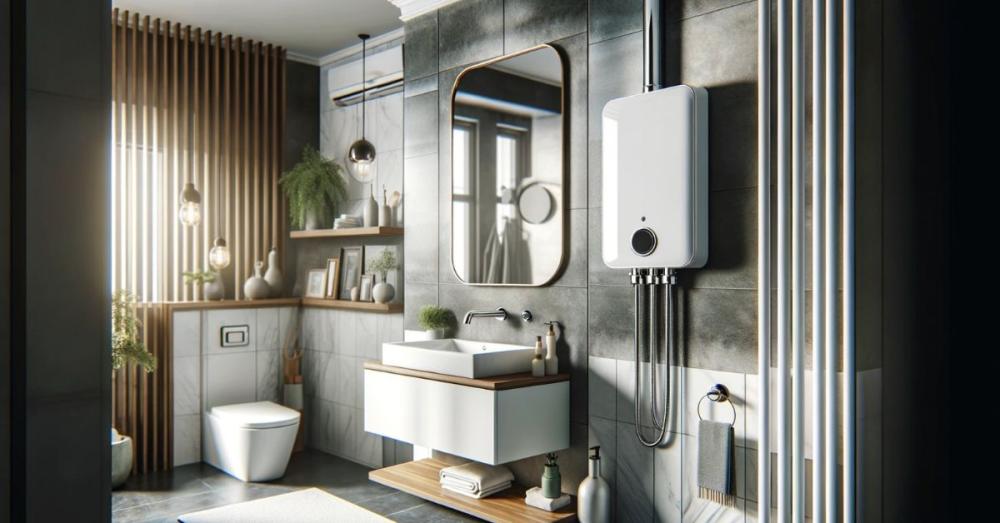
Tankless Bathroom Water Heaters
- Instant heating: Demand heaters deliver hot water only when the tap runs, with significant efficiency gains in homes using around 41 gallons or less per day.
- Space‑saving: No bulky cylinder; compact bodies mount discretely and provide continuous hot water within their flow rate limits.
- Efficiency: Expect 24%–34% higher efficiency than storage tanks at lower daily usage, rising further with point‑of‑use placement.
- Installation: Proper electrical or gas sizing and safe placement within bathroom zones are essential for performance and compliance.
Storage Tank Bathroom Water Heaters
- Built‑in reserve: Small point‑of‑use storage tanks (e.g., a few gallons) preload hot water for immediate draw at a single basin or small fixture group.
- Balanced efficiency: While not as efficient as point‑of‑use tankless, small storage units reduce pipe losses compared to distant cylinders. (EnergyStar).
- Ease of install: Many models connect to standard supplies and outlets; once depleted, recovery time is required before the next hot draw.
Power Usage Considerations
- Voltage and wiring: Electric tankless often require higher voltage and dedicated circuits, while some small storage units can be plug‑in; always verify electrical requirements.
- Energy consumption: Right‑sizing to your flow rate and temperature rise plus higher UEF ratings improves annual energy performance in bathrooms (Energy.gov).
How to Install Bathroom Water Heaters
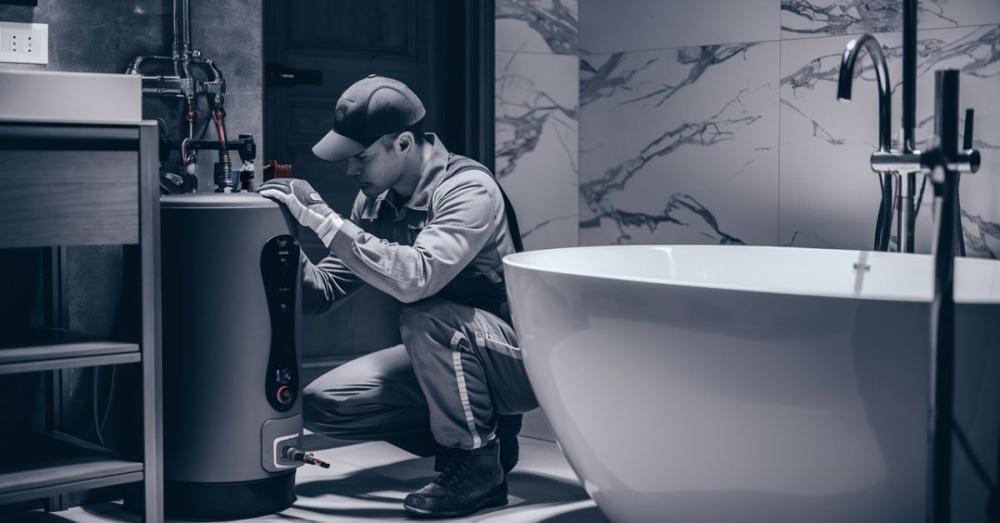
Installing is typically straightforward due to compact size and flexible mounting, but correct zoning, IP rating selection, and circuit protection are critical in wet rooms. Strategic placement near the point of use reduces wait times and wasted water while minimizing visible clutter. Follow manufacturer instructions and local regulations for safety.
Installation Methods
Wall Mounting
- Accessibility: Keeps controls within reach and off the floor, aiding maintenance and temperature adjustment.
- Space‑saving: Utilizes vertical real estate in tight rooms and reduces pipe length to the tap.
Cabinet Mounting
- Hidden install: Fits under sinks or inside vanities to preserve clean bathroom lines while staying accessible for servicing.
- Tidy routing: Short hoses and cables create a neat footprint with minimal visual impact.
Installation Tips
- Placement: Locate near the served fixture with suitable clearance, IP compliance for the zone, and access to water and power.
- Protection: Ensure RCD/GFCI on relevant circuits and follow zone guidance for devices near showers and baths.
Step‑by‑Step Installation Guide
- Prepare the area: Shut off power and water; confirm the planned position’s bathroom zone and required IP rating.
- Mount brackets: Use supplied templates and fixings for secure wall or cabinet mounting with adequate support.
- Connect water: Add a tee if splitting a cold feed; keep lines short and leak‑tested after tightening.
- Connect power: Plug‑in for suitable units or arrange a qualified electrician for hardwiring and protection devices.
- Test and verify: Restore services, purge air, check for leaks, and confirm stable outlet temperature across expected flow rates.
Source - SIKANA English
Professional Installation
Higher‑voltage or higher‑flow demand units often require dedicated circuits and should be installed by qualified electricians to meet safety standards and maintain warranties. In shower areas, ensure compliance with zone, IP, and RCD requirements for safe operation.
What Are the Benefits of Bathroom Water Heaters?
1) Efficient Water Heating
- On‑demand comfort: Demand heaters supply hot water instantly during use, saving energy compared to storing and reheating in tanks.
- Lower energy use: At typical daily volumes, demand heaters can be 24%–34% more efficient than storage tanks, reducing bills.
2) Long Lifespan
- Durable by design: Many tankless units exceed 20 years of service, and replaceable parts can extend usable life further. (HomeServe).
- Maintenance payoff: Annual servicing, descaling where needed, and correct sizing improve longevity and reliability.
3) Water Conservation
- Less waiting, less waste: Point‑of‑use placement shortens lines and reduces cold purge time, lowering water use at the tap.
- Continuous supply: Within rating, demand systems maintain steady temperature without running a cylinder down and flushing lukewarm water.
4) Space‑Saving Design
- Compact footprint: Under‑sink or wall mounts free floor space and simplify layout in compact bathrooms and cloakrooms.
- Clean look: Hidden installs keep bathrooms minimal while delivering heat exactly where needed.
5) Cost Savings
- Lower operating costs: Improved efficiency and zero standby losses reduce energy spend over the heater’s lifetime.
- Targeted use: Localized units avoid heating unused lines or distant fixtures, cutting both power and water costs.
6) Enhanced Comfort
- Stable temperatures: Properly sized units maintain consistent outlet temperatures when flow is within spec. (Consumer Reports).
- Smart controls: Modern heaters use precise thermostats and safety features to balance comfort with protection.
How to Choose the Best Bathroom Water Heater
- Match to usage: Estimate flow rate and temperature rise for your basin or shower to size a demand unit correctly.
- Check UEF/EF: Higher efficiency ratings indicate better performance; combine with point‑of‑use installs for best results.
- Verify IP by zone: Choose IP67 for Zone 0, IP65 recommended for Zone 1, and at least IP44 for Zone 2 near basins.
- Plan the circuit: Confirm voltage, amperage, RCD, and breaker sizing for electric models before purchase.
What Are the Best Bathroom Water Heaters?
If you are looking for the ideal bathroom water heater, there are many excellent options available at Meteor Electrical. Our selection of ATC bathroom water heaters is renowned for their efficiency, reliability, and user-friendly features. Here are some of the top choices to consider:
1. ATC 10 Litre Under Sink Water Heater
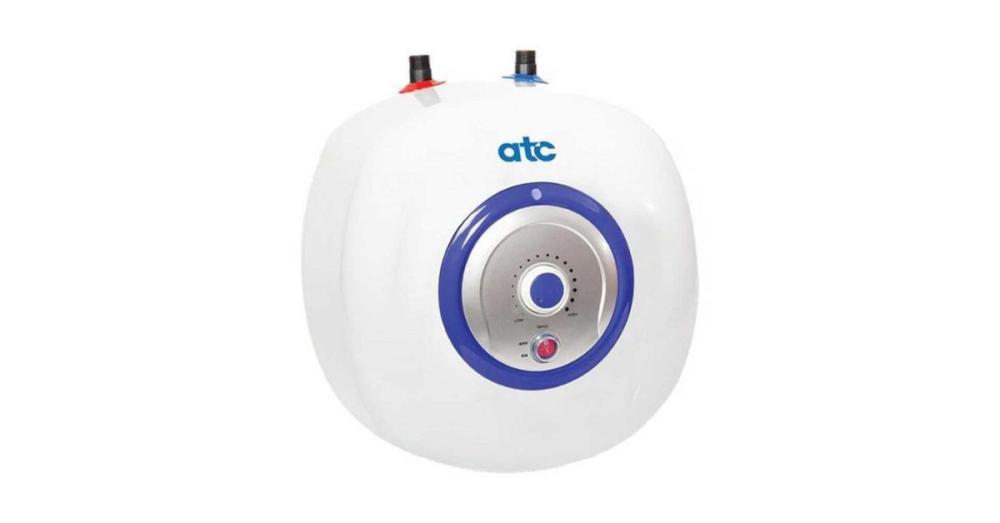
- High Capacity: Designed for high water consumption, the ATC 10-litre under-sink water heater provides ample hot water with minimal wait time.
- Versatile Installation: This heater can be installed in various locations, making it a versatile choice for both residential and commercial properties.
- Energy Efficient: The 10-litre capacity ensures you get enough hot water without wasting energy, making it a highly efficient option for your bathroom needs.
2. ATC 5 Litre Under Sink Water Heater
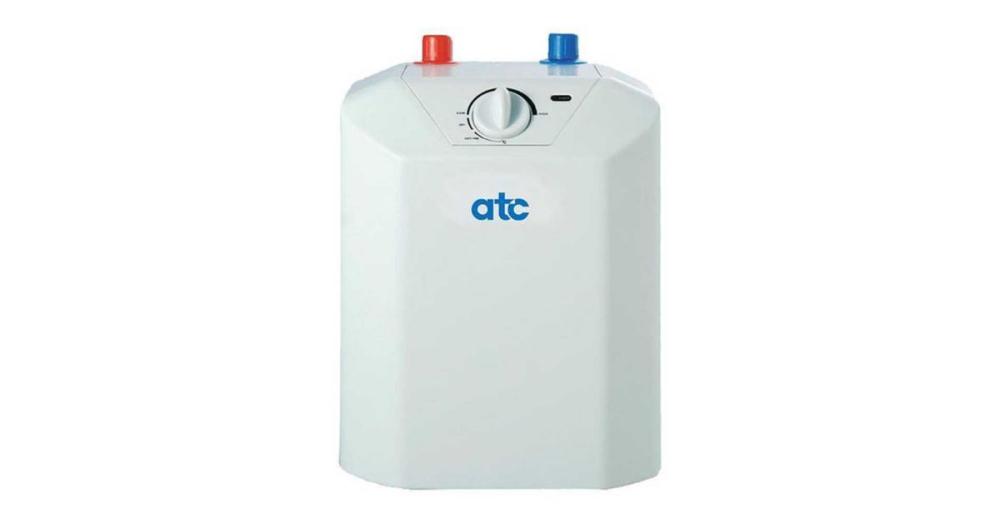
- Moderate Capacity: Perfect for households with moderate hot water needs, the ATC 5-litre under-sink water heater offers a balance between capacity and compactness.
- Easy Installation: Its compact size allows for easy installation under any sink, saving valuable space in your bathroom.
- Cost-Effective: This 5-litre model's efficient heating qualities help you save on heating costs compared to traditional venting systems. Made from high-quality materials, it ensures durability and long-term performance.
Why Choose ATC Bathroom Water Heaters from Meteor Electrical?
- Trusted Brand: ATC is a trusted name in the industry, known for producing high-quality, reliable, and efficient water heaters.
- Customer Support: ATC products are designed with customer satisfaction in mind, providing comfort and convenience with every use.
- Superior Performance: These heaters perform better than many gas water heaters, offering consistent and reliable hot water whenever you need it.
At Meteor Electrical, we are committed to providing you with the best bathroom water heating solutions. Our range of ATC water heaters ensures you find the perfect fit for your home, enhancing your daily comfort and convenience. Visit our website to explore our full range of bathroom water heaters and make the best choice for your needs.
Conclusion
Bathroom water heaters deliver instant comfort, strong efficiency, and tidy installations that suit tight spaces while complying with wet‑room safety rules. For a winter‑ready upgrade, explore compact under‑sink models and demand‑type heaters that reduce costs, save water, and keep temperatures steady throughout daily routines. For quality products, expert guidance, and fast delivery, shop Meteor Electrical’s selection of bathroom water heaters and power up your comfort today with an easy, reliable install.
Ready for cozy, efficient hot water on demand? Shop bathroom water heaters at Meteor Electrical and warm up every tap this winter.
FAQs
1) What is the best type of water heater for a bathroom?
For quick hot water at a basin, a compact under‑sink or small storage unit is ideal, while a properly sized tankless unit is best for instant shower comfort and energy savings.
2) How do I install a bathroom water heater?
Mount on the wall or in a cabinet, connect short water lines, and plug in or hardwire per the model; comply with bathroom zones, IP ratings, and use RCD protection where required.
3) What is an IP rating for bathroom water heaters?
IP ratings define resistance to solids and water under EN 60529/BS EN 60529, with higher second digits indicating greater water protection for wet zones.
4) Which IP rating do I need in each bathroom zone?
Use IP67 in Zone 0, IP65 recommended in Zone 1, and at least IP44 for Zone 2, including within 60 cm of a basin tap.
5) Are tankless water heaters energy‑efficient?
Yes, demand‑type heaters are typically 24%–34% more efficient than storage tanks for homes using around 41 gallons or less of hot water daily.
6) How long do bathroom water heaters last?
Many tankless models have life expectancies beyond 20 years, and replaceable parts can extend service life over time.
7) Can I install a bathroom water heater myself?
DIY is feasible for some plug‑in units, but higher‑voltage or shower‑zone installations should be handled by qualified electricians to meet safety rules.
8) How do I size a tankless bathroom water heater?
Calculate required flow in liters per minute and temperature rise from inlet to target output, then choose a unit rated to deliver both simultaneously.
9) Do electric models need special circuits in bathrooms?
Yes, follow zone rules and ensure appropriate breakers, RCDs, and wiring for the voltage and current draw specified by the manufacturer.
10) What efficiency metrics should I check before buying?
Look for UEF/EF ratings and align with expected daily usage; higher efficiency plus point‑of‑use placement reduces energy and water waste.

